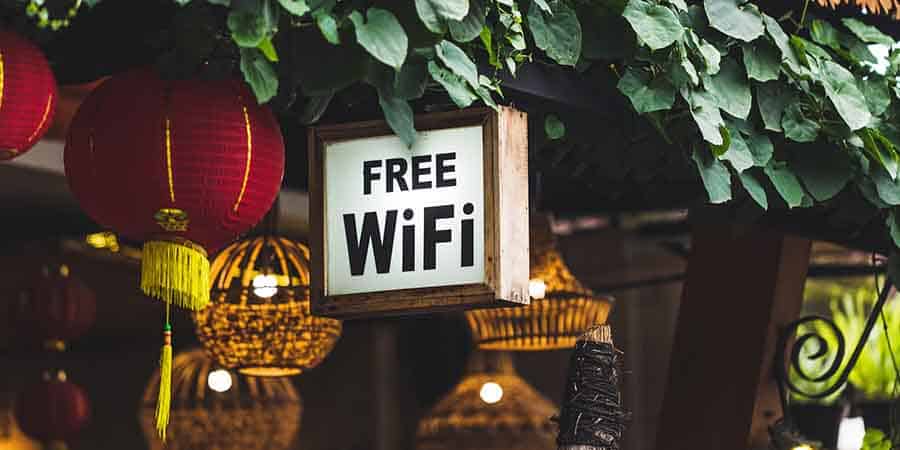No matter where you live, a VPN can provide you with greater peace of mind when using the internet.
But when you’re traveling internationally, it becomes an absolute necessity.
Internet laws in foreign countries are complex and highly variable. What’s legal to browse in one country could land you in jail in another.
And even if you visit a country with favorable internet laws, you’re still at risk of being targeted by hackers during your travels. Hotel, airport, and cafe WiFi networks are often poorly secured, and using them could put your data and financial security in jeopardy.
With a VPN, you’ll be armed with everything you need to protect yourself while you’re traveling internationally. It’ll keep your browsing history and private data safe from hackers, network snoops, ISPs, and governments.
Here are the top five reasons to use a VPN when traveling to other countries. We’ll identify the threats you face and show you how a VPN can mitigate those threats.
Top Five Reasons to Use a VPN When Traveling Internationally
1. VPNs Protect You Against Restrictive Internet Laws
The internet was originally designed to be a place where information could be shared freely and openly with everyone.
But in practice, the things you say and do online could get you in serious trouble in many countries around the world.
Take Mona el-Mazbouh, a tourist from Lebanon who visited Egypt in 2018. While in Egypt, she posted a video to Facebook in which she described being sexually harassed, robbed, and disrespected by locals on her trip.
But while attempting to return home, she was arrested at the Cairo airport and charged with “spreading false rumors that aim to undermine society, attack religions, and public indecency.” She was found guilty and sentenced to 8 years in prison — all for posting a video while on vacation.
There’s also the case of Australian citizen Alek Sigley, who was studying abroad in North Korea when he was arrested for posting a photo of a toy tank on social media. After an international outcry, Sigley was freed and allowed to return home, but not before spending nine terrifying days in an interrogation cell.
And that’s not to mention the USA’s notorious PRISM surveillance program. Under this program, the government is free to monitor and store internet data from non-citizens, including emails and browsing histories.
How a VPN Prevents Government Surveillance
These cases provide evidence of a fact we can’t afford to ignore: governments around the world monitor internet traffic and arrest people, including tourists, for the things they post online.
And even if they’re not actively monitoring you, many countries (including the U.K. and Australia) will store your data for as long as two years. These data retention laws mean that your private web activity could be viewed or exposed long after you return home.
You may not be able to change the way these governments operate, but you can make it impossible for them to monitor your internet traffic by using a VPN.
A VPN’s powerful encryption makes your traffic useless to governments. Encrypted data doesn’t reveal your browsing history, social media posts, or email content — it merely looks like gibberish.
If the government can’t see what you’re doing online, it can’t persecute you for it. Depending on where you travel, a VPN could quite literally save your life.
2. VPNs Help You Circumvent Internet Censorship
What if you don’t plan on making any potentially illegal social media posts while you’re abroad? Your destination’s internet laws won’t have any impact on you… right?
Wrong.
Many countries have some form of internet censorship in place; in fact, only 23% of countries worldwide have truly free internet. When you go online while you’re traveling, you’re only seeing the sites the local government wants you to see.
In many cases, internet censorship is used to repress political dissent and content that doesn’t align with the government’s views. Often, this results in massive social media bans and the blacklisting of foreign news sources.
The most notorious perpetrator of internet censorship is China, whose “Great Firewall of China” blocks Facebook, Twitter, and YouTube, along with search results for keywords like “South Park” and “John Oliver.” Additionally, news sources like the New York Times and the BBC have been blocked after publishing articles that criticized China.
In China and countries with similar censorship policies like Russia and Turkey, a VPN is the only way to access the sites you know and love.
VPNs encrypt your data in such a way that the government’s internet filters can’t tell which sites you’re visiting. Since they don’t know what URLs you’re requesting, they can’t prevent you from viewing them.
Some countries, including China, have banned VPNs in an attempt to reinforce censorship laws. However, many VPNs offer obfuscation modes that make your traffic even more stealthy — when used properly, the government can’t tell you’re using a VPN at all.
3. VPNs Keep You Safe on Public WiFi
Whether you’re killing time during a long layover, grabbing coffee in a local cafe, or unwinding in your hotel room after a day of sightseeing, you’ll probably use public WiFi at some point on your trip.
It’s convenient, sure, but you pay the price for using it: your privacy.
You never know who’s actually running that public WiFi hotspot. It could be a nosy coffee shop manager who likes to spy on customers or a hacker who’s set up a fake network to steal passwords and credit card numbers.
Case in point: journalist Steven Petrow, who, while traveling, used in-flight WiFi to research and write an article about the privacy battle between Apple and the FBI.
His choice of topic proved quite ironic. When he got off the plane, he was approached by a fellow passenger who recited a long email that Petrow had written.
The mysterious man was a hacker who had exploited the plane’s WiFi network and was able to view everything that Petrow was doing online. This particular hacker’s motivation was simply to prove a point about security; most others are far more malicious.
Had Petrow been using a VPN, the hacker would certainly have skipped over him and chosen a different target. Not even the best hackers can break the encryption used by VPNs, so even if a network is compromised, your internet activity will remain private.
4. VPNs Let You Access Geo-Restricted Sites
You’ve been out exploring a new country all day, and you’re exhausted. When you get back to your hotel room, all you want to do is unwind with an episode of the Office on Netflix before going to sleep.
But when you sign in and search for the show, it’s nowhere to be found. You do a bit of digging and find out that Netflix hasn’t licensed the show for viewers in the country you’re visiting — it’s the U.S. only.
Even though you’re from the U.S., you can’t stream U.S.-only content when you’re in a different country. That’s because Netflix and other streaming sites use your IP address to determine which content you’re allowed to watch — and if you’re in a foreign country, your IP address will reflect that.
But you can get around these geo-restrictions by using a VPN to mask your location. When you use a VPN, you’ll be able to pick a server location and get a new IP address from that location.
Once you’re connected, all the sites you visit will perceive you as browsing from your server location, no matter where you actually are. So if you’re in, say, Japan and you visit Netflix while connected to a U.S. VPN server, you’ll be shown U.S. streaming content.
This trick doesn’t just work on streaming sites, either. It also unblocks geo-restricted content on news sites, online retailers, gaming servers, gambling sites, and social media platforms.
5. VPNs Prevent Bank Account Lockouts
Foreign identity theft is a huge problem, and many financial institutions have implemented tough security measures to prevent it.
One such measure: only allowing website and app access from the country the bank is based in.
If you’re an American and your bank notices an IP address from, say, Italy trying to log into your account, it’ll flag the activity as fraudulent and lock down your account. Your balances will be frozen, and you won’t be able to access your money until you confirm your identity with your bank and unlock your account.
This isn’t a big deal when you’re at home and able to get to a bank branch within a few minutes.
But when you’re thousands of miles away from home and you absentmindedly log into your banking app to check your balance, it’s enough to turn your vacation into a nightmare.
Now you can’t access your money, and you have to spend countless hours (and expensive international minutes) calling your bank to get everything sorted out. Not the way you wanted to spend this trip!
A VPN prevents this problem and makes your online banking even more secure.
With it, you can mask your IP address so that it looks like you’re logging in from your home country. And the extra encryption a VPN provides will keep your credentials and finances safe from hackers and snoops.
VPN Services We Like
| VPN Service | Price | Jurisdiction | # of Countries | # of Servers |
|---|---|---|---|---|

|
$
3.49
/ PER MONTH |
Panama
|
59
|
5677
|
| For those who prefer the premium experience, NordVPN has you covered. Offering innovative privacy features like Double VPN and the CyberSec malware and ad blocker, it’s ideal for anyone looking to amp up their online security. | ||||

|
$
8.32
/ PER MONTH |
British Virgin Islands
|
94
|
3000
|
| An ultra-secure server array, a stunning app and impressive streaming capabilities – what’s not to like about ExpressVPN? It’s one of the most trusted names in the VPN industry, keeping you and your data secure no matter where you go. | ||||

|
$
1.16
/ PER MONTH |
Singapore
|
56
|
1000
|
| The first personal VPN to implement split tunneling, Ivacy’s got a lot more to boast about: over 1,000 servers, an effortless streaming mode and very affordable pricing. | ||||



